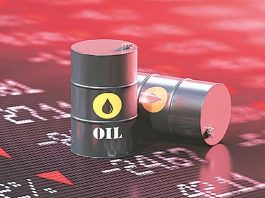Private Sector Growth Momentum Declines, Employment Rises–PMI
The Nigerian private sector registered a slight loss of growth momentum in January, according to Stanbic IBTC purchasing managers index (PMI) released today by Standard and Poor Ratings.
According to the PMI report, output and new business continued to rise markedly, but at softer rates than at the end of 2022,
On a more positive note, the report shows that Nigerian private firms raised employment at the fastest pace since June 2018 as part of efforts to complete work on time. On the price front, rates of inflation of input costs and output prices softened in January but remained elevated.
The headline PMI dipped to 53.5 in January from 54.6 in December. Although still signalling a solid monthly strengthening of the private sector and the thirty-first in consecutive months, the rate of improvement was the softest since August 2022.
It noted that business activity increased at a much slower pace at the start of the year, despite the rate of growth remaining mark. The latest rise was the weakest in five months. Demand continued to improve, but some firms reported a moderation in customer numbers.
Activity increased across each of the four broad sectors covered by the survey. The rate of expansion in new business also softened in January, but remained sharp nonetheless, again reflecting higher demand from customers.
A desire to try and complete projects on time led companies to ramp up their hiring activities at the start of the year, the report added.
PMI report indicates that employment increased at a solid pace which was the fastest since June 2018. Despite expanded staffing levels, backlogs of work increased for the first time in three months.
Firms reported having been hindered by issues with machinery and power supply. Higher workloads and positive expectations regarding the outlook for activity led companies to expand their purchasing activity sharply again, with the rate of growth unchanged from December.
In turn, stocks of purchases also rose further. Efforts to secure inputs were helped by improving supplier performance. Competition among vendors, quiet road conditions and prompt payments all contributed to a shortening of delivery times, one that was the most pronounced in four months.
The rate of input cost inflation softened for the second month running in January and was at a one-year low. The slowdown in overall cost inflation largely reflected a softer rise in purchase prices, albeit one that was still substantial.
Purchase costs increased on the back of rising fuel and raw material costs, exacerbated by currency weakness. Meanwhile, staff costs rose at the fastest pace in 11 months as companies increased pay in line with higher living costs. Output price inflation also remained elevated as higher cost burdens were passed on to customers.
Speaking to this, Muyiwa Oni, Head of Equity Research West Africa at Stanbic IBTC Bank said, “Stanbic IBTC headline PMI declined to 53.5 in Jan from 54.6 in Dec 2022. Indeed, private sector activities have continued to expand after recovery from the pandemic-induced recession, nevertheless, the pace of growth recorded in Jan was the slowest since Aug 22. This was attributed to moderating customer numbers, despite increased demand.
“Business expansion also softened during the month, which was attributed to power supply and machinery challenges. Notably, the inflation rate for both input and output cost moderated in Jan alluding to our expectation for declining inflation in 2023”.
“We expect inflation to gradually moderate in 2023 on the back of a favourable base. Nevertheless, it is likely to still remain above the Central Bank’s target range of 6-9%.
“The Central Bank of Nigeria’s MPC in Jan however increased policy rate yet again by 100bps to 17.5% to continue taming surging inflation pressures. Despite the persistent policy rate hike, the negative real interest rate has not narrowed meaningfully, even as yields across the curve have also not increased at the same quantum; whereas inflation remains elevated.
“Moreso, the government’s expansionary 2023 budget buttresses its misaligned stance of simultaneously loosening fiscal and tightening monetary policy. Inflation likely peaked in Nov 2022 at 21.47% year on year and should continue trending downwards.
“However, upside risks to inflation persist from petrol subsidy removal during the year and likely lagged impact of flooding experienced during the harvest season in the fourth quarter of 2022”, Oni stated.
>>>Naira Challenges Raise Possibility of Materials Devaluation – Report




